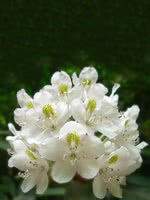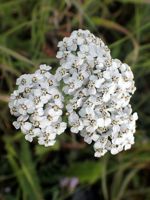Mon-Fri 9am - 5pm Mountain time
White Lights Rhododendron (Azalea) vs Yarrow
Rhododendron x White Lights
Achillea borealis (Previously Achillea millefolium)
ONLY AVAILABLE BY CONTRACT GROW
NOT AVAILABLE THIS SEASON
(new stock expected: fall of 2026)
White Lights Rhododendron is part of the Northern Lights Series, cold hardy, and deciduous. In late spring you'll be drawn to its fragrant white blooms. In fall, the foliage turns a beautiful purple-bronze color. Pruning is recommended after the flowers are spent to control the size and shape of this shrub.
White Lights Rhododendron should be your next hedge/screen, or plant it on its own as a specimen plant.
Yarrow is a herbaceous, native wildflower that is found across Canada. It features large, flat clusters of tiny white flowers. The blooms attract a variety of pollinators, making it an ideal choice for pollinator gardens. While partial shade is tolerated, the best flowering occurs in full sun. Yarrow is resistant to deer and rabbits, making it both a beautiful and practical addition to your landscape.
The entire plant is edible, but leaves and flowers are most commonly consumed. They have a strong licorice scent and a mild sweet flavor that is similar to tarragon. Yarrow leaves can also be used as a natural insect repellent.
It is important to plant Yarrow in the right place, it can spread quickly via both rhizomes and self-seeding. Deadheading the spent flowers will extend the bloom season and can help limit self-seeding.
White Lights Rhododendron (Azalea) Quick Facts
Yarrow Quick Facts
Toxicity: All parts of a rhododendron bush, including the leaves, stems and blooms, are toxic to cats, dogs, and horses.
Toxicity: toxic to dogs, cats, and horses

